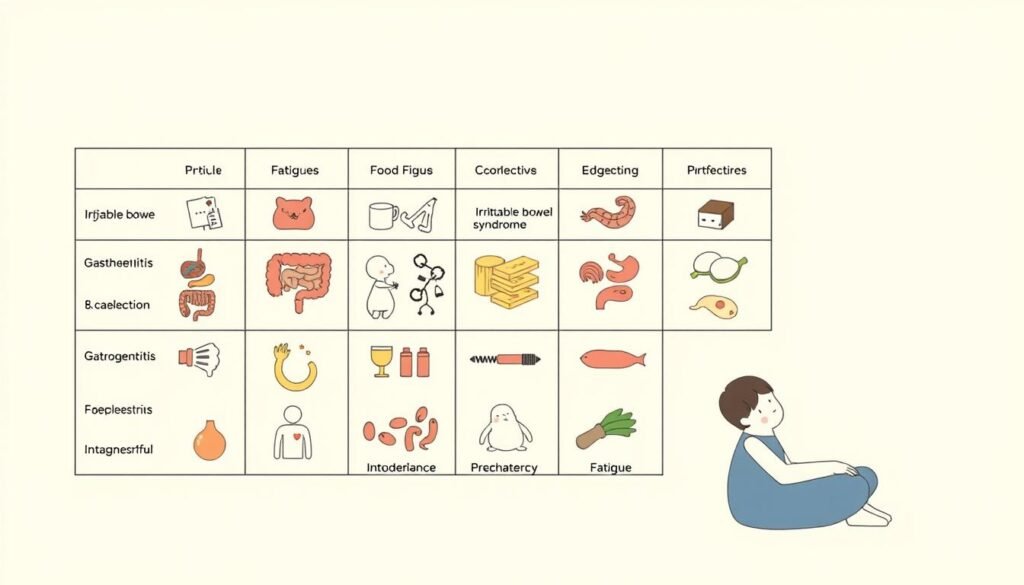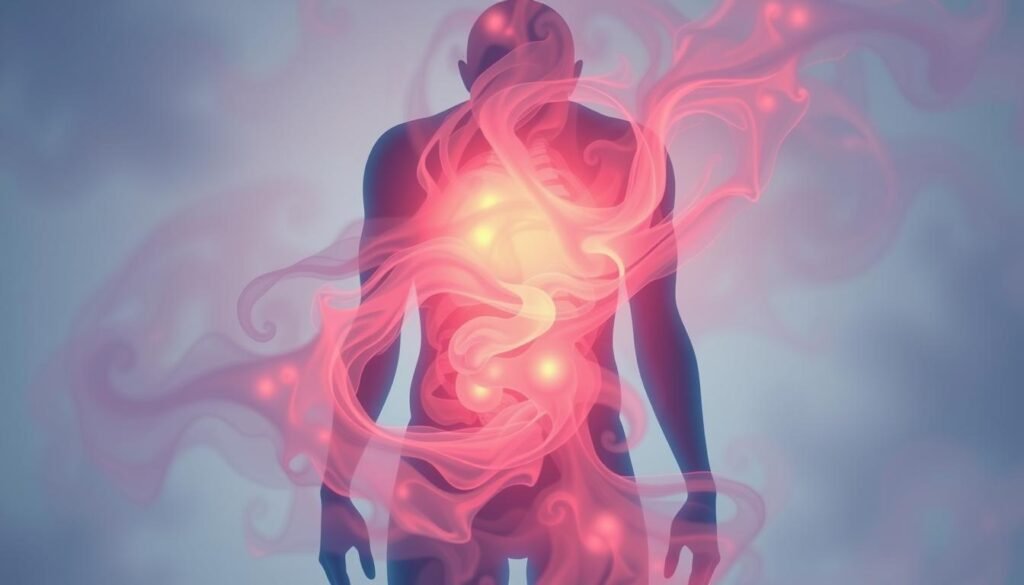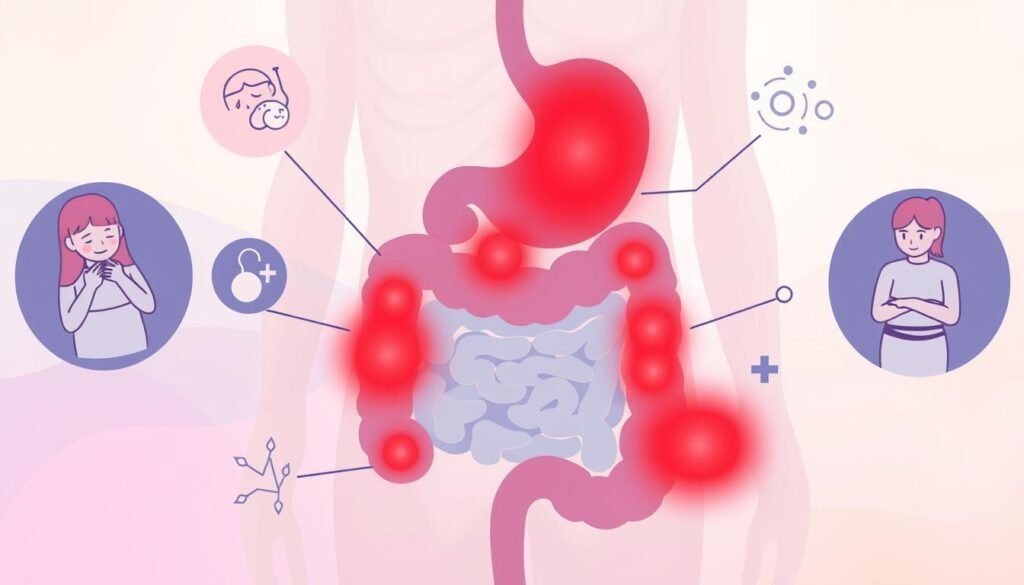Did you know nearly 70 million Americans deal with chronic digestive issues? This fact shows the huge impact gastrointestinal problems have on life. Stomach pain and fatigue are common signs that may upset daily routines and hint at deeper health issues. Understanding these symptoms can help people find out the reasons, which range from digestive disorders to mental health factors. This knowledge enables sufferers to seek successful treatments that ease both problems.
Key Takeaways
- Stomach pain and fatigue can indicate serious health issues.
- Understanding their interconnectedness is essential for proper management.
- Multiple causes, including gastrointestinal issues, can affect overall well-being.
- Recognizing accompanying symptoms can aid in timely intervention.
- Home remedies and dietary changes may offer relief for mild cases.
- Professional help is essential for more severe or persistent symptoms.
Understanding Stomach Pain
Stomach pain can show something is wrong in the digestive system. This pain often comes from inflammation in the stomach or intestines. It can be caused by things like viruses, what we eat, and long-term health problems.
Knowing about digestive problems helps us deal with them better. For example, Irritable Bowel Syndrome (IBS) affects many in the U.S. It can cause cramps, bloating, and gas. This can make people very tired, with 61% of IBS patients feeling this way.
It’s important to pay attention to symptoms to figure out the cause of stomach pain. Symptoms like changes in bathroom habits or continuous nausea need to be looked at closely. Stomach pain can be short or last a long time. Either way, it’s key to get it checked to prevent serious issues.
| Condition | Symptoms | Management |
|---|---|---|
| Irritable Bowel Syndrome (IBS) | Constipation, abdominal pain, bloating, gas | Medications, dietary changes, lifestyle modifications |
| Gastroenteritis | Nausea, vomiting, diarrhea, abdominal pain | Home remedies, adequate hydration |
| Acute Conditions (e.g. Appendicitis) | Severe, sudden abdominal pain | Surgery or immediate medical attention |
| Chronic Conditions (e.g. Crohn’s Disease) | Intermittent, fluctuating abdominal pain | Long-term management strategies, medical therapies |
Understanding the link between symptoms and health helps in managing stomach pain. Getting advice from doctors is important. For those always feeling tired, looking into how lifestyle affects energy is helpful. Check out why fatigue happens after eating.
Exploring Fatigue and Its Connection to Stomach Pain
Fatigue can deeply affect daily life and overall well-being. It comes from various sources, such as lifestyle, health conditions, and stress. Interestingly, many people with stomach issues also feel very tired. This is especially true for those with Irritable Bowel Syndrome (IBS), where up to half report fatigue.
The link between stomach pain and tiredness is strong. IBS can cause pain, cramping, gas, bloating, and bowel changes. Stress makes these issues worse. This creates a cycle where stomach pain causes more fatigue, making you feel even more tired.
Stress adds significantly to this issue. About 75% of IBS sufferers believe stress impacts their symptoms. The mix of mental health, digestion, and tiredness shows we must look after our emotional and physical health. Making lifestyle and diet changes and talking to a doctor can help. If stomach issues don’t go away, it’s smart to consult a healthcare provider.
Knowing how fatigue and stomach discomfort are linked can improve management. Understanding this connection shows that improving one symptom might help the other. This can lead to a better health-related quality of life.
Common Causes of Stomach Pain and Fatigue
Stomach pain and fatigue often come from different issues that affect our health. Knowing the causes helps us understand our symptoms better. This understanding can guide us to find the right help.
Gastrointestinal Issues
Gastrointestinal problems often lead to stomach pain and fatigue. Issues like gastroenteritis are caused by germs like viruses or bacteria. This can lead to symptoms like dizziness and headaches because of dehydration. Chronic conditions like irritable bowel syndrome (IBS) cause long-term pain and tiredness. It’s important to manage these conditions well. For more info, check out this resource.
Psychological Factors
Our mental health greatly affects our digestion and energy. Stress and depression can make stomach issues worse, leading to more pain and tiredness. This shows how our minds and bodies are connected. Managing stress is key to managing physical symptoms too.
Menstrual and Hormonal Changes
Hormonal shifts, especially during periods, can cause stomach pain and fatigue. These changes can affect energy levels, making us feel tired. Eating right or seeing a doctor can help with these symptoms.

| Condition | Symptoms | Recommended Action |
|---|---|---|
| Gastroenteritis | Stomach pain, nausea, dehydration | Hydration, possible antibiotic treatment |
| IBS | Chronic abdominal pain, bloating | Dietary changes, stress management |
| Hormonal Changes | Menstrual pain, fatigue | Consult with a healthcare provider |
| Psychological Stressors | Anxiety, fatigue | Seek mental health support |
Symptoms Accompanying Stomach Pain and Fatigue
Identifying symptoms of stomach pain and tiredness helps pinpoint health issues. Knowing these signs early is vital for getting the right treatment. It makes sure people get medical help when needed.
Identifying Abdominal Discomfort
Stomach discomfort can feel like sharp pains, cramps, or a dull ache. Most of these pains, about 75%, come from common problems like indigestion. They happen in different areas of the stomach:
- Upper abdominal discomfort often comes from peptic ulcers or GERD.
- Middle abdominal discomfort could mean irritable bowel syndrome in 20% of cases.
- Lower abdominal discomfort is usually because of constipation or appendicitis.
If you have sharp stomach pain lasting more than 48 hours, see a doctor. It’s important for finding out the problem and treating it correctly.
Recognizing Signs of Fatigue
Fatigue often comes with stomach issues. It’s feeling very tired for many reasons, like not enough sleep or stress. Signs of being really tired include:
- Feeling worn out even after sleeping.
- Having trouble staying focused or awake.
- Feeling weak or not having much energy.
Feeling very tired and having bad stomach pain is a bad sign. It could mean something serious. You should get it checked by a doctor fast.

Gastrointestinal Issues and Their Solutions
Stomach flu and gastroenteritis can cause a lot of discomfort. This includes stomach pain and feeling tired. Understanding these conditions is key to treating them. Knowing what causes your stomach issues is the first step to getting better.
Stomach Flu and Gastroenteritis
Stomach flu means inflammation in your stomach and guts. It brings vomiting, diarrhea, and cramps. These can make you feel very tired. Keeping hydrated is very important. Drinking lots of water or broth keeps you hydrated. For bad cases, doctors may suggest drinks with electrolytes to replace lost minerals.
Food Poisoning
Food poisoning comes from eating bad food. It causes stomach problems soon after eating. You might feel sick, throw up, have diarrhea, or get stomach pains. Avoiding bad food is key. Cooking well and keeping things clean helps a lot.
If your stomach problems don’t go away, talking to a doctor helps. They might suggest eating differently or adding probiotics. Changing your lifestyle could help too. For tips on dealing with a sick gut, check this resource.

Recognizing When to Seek Medical Help
Knowing when to get medical help for stomach pain and tiredness is key. If you have stomach pain that doesn’t get better with home remedies, it’s time to pay attention. Watch out for any sudden changes in your symptoms.
It’s especially important if you have severe symptoms like high fever, a fast heartbeat, or blood in your stools. These signs suggest that it’s time to seek medical advice without delay.
Timely medical help is very important, according to statistics. One in 10 Americans may suffer from an ulcer. Conditions like gallstones can also cause a lot of pain and need quick treatment. And appendicitis? It often causes severe, sharp pain in the lower right side of the belly, leading to emergency room visits.
Some other serious signs are:
- Severe pain after an accident
- Pressure or pain in the chest
- Inability to sit still due to intense pain
- Bloody stool
- Fever exceeding 101 degrees Fahrenheit
- Excessive vomiting
- Yellowing of skin or eyes
- Difficulty breathing
If you have symptoms like ongoing constipation, pain when peeing, losing weight without trying, or stomach pain during pregnancy, get help. Almost 5% of emergency room visits are for belly pain. Paying attention to severe symptoms can save lives.
| Symptom | Action Required |
|---|---|
| Severe and sudden stomach pain | Immediate medical assistance |
| Fever above 101 degrees | Consult a healthcare professional |
| Blood in stools | Emergency medical evaluation |
| Inability to eat or drink | Seek medical advice |
| Signs of dehydration | Visit a medical facility |
Being proactive about your health is crucial. Noticing signs like digestive problems and fatigue can lead to early doctor visits. This ensures you get the right treatment quickly for any serious health issues.
Home Remedies for Relief from Stomach Pain and Fatigue
Simple home remedies can provide relief from stomach pain and fatigue. They support well-being by focusing on natural ways to ease discomfort. It’s vital to stay hydrated, as drinking water helps with gastrointestinal issues and keeps energy up.
Eating foods that are easy on the stomach can also speed up recovery. Paying attention to diet is a key part of feeling better.
Staying Hydrated
Being well-hydrated is crucial for avoiding stomach pain and fatigue problems. A lack of fluids can make symptoms worse. Using rehydration solutions is helpful, especially if you’re dealing with gastroenteritis or food poisoning. Good options to drink include:
- Water
- Herbal teas such as chamomile or peppermint
- Rice water
Staying hydrated fights off fatigue and supports healthy digestion. Look for dehydration signs like dry mouth and dizziness. For details on how home remedies can help, check out this informative article.
Dietary Changes
Making dietary changes is vital for reducing stomach pain and fatigue. Choose foods that are bland and easy to digest and stay away from things that can irritate your stomach, such as:
- Caffeine
- Spicy dishes
- Greasy or fatty meals
Following the BRAT diet—bananas, rice, applesauce, and toast—helps protect the stomach lining. Other useful remedies include:
- Ginger tea
- Yogurt with probiotics
- Fennel seeds for digestive health
These steps can greatly ease gastrointestinal issues. Combining regular self-care with home remedies speeds up recovery and boosts health. These effective methods can help manage symptoms and bring your body back to balance.
| Home Remedies | Benefits |
|---|---|
| Ginger | Reduces nausea and aids digestion |
| Peppermint tea | Soothes stomach muscles and alleviates cramps |
| Rice water | Helps rehydrate and supports digestive recovery |
| Yogurt | Promotes healthy gut flora |
Stomach Pain and Fatigue: Common Causes & Solutions
Knowing how stomach pain and fatigue are linked is key. Various factors, like lifestyle, mental health, and health conditions play big roles. These can affect how we feel day to day.
Bad habits, such as too much alcohol or caffeine, can make us feel tired and sick. Stress, anxiety, and depression can also cause these symptoms. Diseases like liver or kidney problems may cause stomach pain and fatigue too.
Here are some effective solutions:
| Condition | Common Causes | Effective Solutions |
|---|---|---|
| Stomach Pain | Gastrointestinal infections, food intolerances, stress | Dietary changes, proper hydration, stress management techniques |
| Fatigue | Anemia, chronic illness, poor sleep | Balanced diet, regular exercise, medical treatment, and self-care |
| Both Symptoms | Depression, anxiety, chronic diseases | Therapy, medications, and lifestyle changes |
To avoid stomach pain and fatigue, take preventive steps. Sleep well, manage stress, limit alcohol, and eat healthily. Spotting and tackling these symptoms early helps manage them better.
Conclusion
Stomach pain and fatigue are closely linked, showing why understanding health is important. These issues often come from the same places, like stomach problems or stress. This connection means treatment should look at the whole picture to improve life quality.
Many people see doctors for stomach pain, which is common and affects daily life. Fatigue often comes with it, showing the wide range of health troubles. Knowing the signs and seeing a doctor early, especially with serious symptoms like losing weight without trying, is key.
To ease stomach pain and fatigue, changing your lifestyle and diet helps. Adding certain supplements might also bring relief. For tips on battling fatigue and boosting adrenal health, check out this page. Paying attention to these problems helps you take control of your health and feel better overall.